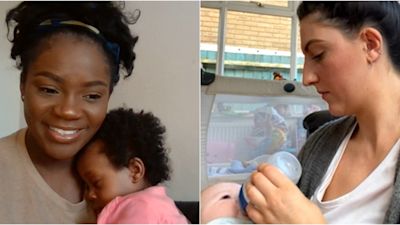The baby blindspot: Data reveals impact of Covid on newborns and their parents

Video report by ITV News Consumer Editor Chris Choi and words by Consumer Producer Hannah Kings
This week marked a year since the UK first entered the Covid-19 lockdown. Now, exclusive data obtained by ITV News reveals the impact this year has had on babies born during that time - and on their parents.
Over 600,000 children have been born in England alone since we first entered lockdown one year ago.
For children this age across the UK, the first few months of life have been different to anything youngsters have experienced before.
In many cases, their parents have also had to adjust to child-rearing without the usual support network of friends, family and social groups.
We spoke to Elfie Astbury – whose son Rowan was born on March 22 last year – just hours before the first lockdown began.
Elfie Astbury says she has felt "isolated" as a new mother
Elfie says: "I wish I could have had a different experience.
"It was very isolating not being able to see family and friends. My mental health suffered at the beginning."
New figures, based on monthly average data, released to ITV News by the NSPCC reveal a 45% rise in helpline calls about parents' mental health since April last year.
Action for Children told us that 66% of calls to its Parent Talk line involved worries about children's development. 55% concerned children's emotional wellbeing.
It comes as the government releases its long-awaited early years review of provision for children in the first 1,001 days of life – from conception to aged two.
It outlines plans to reduce inequalities in the services available to these children and their families, but does not allocate any extra funding.
The NSPCC told us babies now need urgent action - and money - from the government to back up the review’s "warm words".
It said the government needs to rebuild the health visiting workforce – which has reduced significantly since 2015 – so that every family gets the support they need.
Charities are calling on the government to address its "baby blindspot" and pledge funding to support the babies born during lockdown – who they say have been "forgotten" in the pandemic recovery plans so far.
The NSPCC urges the government to do more to support babies born during lockdown
Vicky Ford MP - Minister for Children and Families – says the government has always been focused on early years development.
She says a "huge amount" of the government’s local authority budget goes to children and social services, but that "sometimes it is a question of signposting families to the support that’s there". Tinuke Awe’s daughter Eden was born in April – soon after restrictions were introduced. Tinuke has missed being able to meet other mums and babies, and worries about the lasting effects the past year could have on Eden.
She said: "When we are outside, everyone is behind a mask, and I just think it’s such a strange time. I do worry about the effects that will have on her long-term, because it’s not normal – it’s not life as we know it."
Khalesa Chowdhury had her third baby, Usmaan, in September. Having had two older children, she noticed a real difference in the support she could access this time.
Khalesa says she's been unable to mark cultural milestones with her wider family
Khalesa said: "No one’s really asking you about that period of time at the beginning – whether you’re feeling low.
"If they are, the appointments are so brief – and you have your mask on. It feels almost as though you’re there to get the necessities over with as quickly as you can."
Albie was also born in September. His mum Laura Johnson says it's been difficult without face-to-face contact with other mums going through similar experiences.
Laura told us: "I think there have been times where it’s been quite lonely.
"A Zoom chat – it just doesn’t cut it sometimes."
Since discovering she was expecting her first baby Anayah – who was born in November, Abigail Mensah says she has struggled to access support.
She told us: "I was very, very, very tearful. I found myself just Googling stuff when I didn’t have that support where I could call someone."
As we all prepare to take the first tentative steps out of lockdown, some say more should be done for those who are truly taking their first steps – and for the parents who have until now found themselves isolated from support.